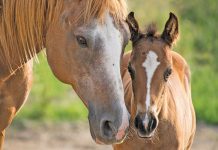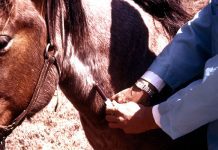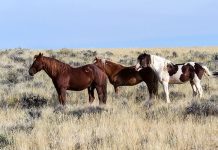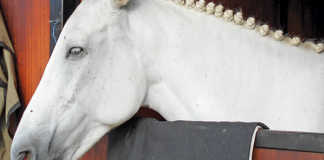Flies belong to the order Diptera, meaning “two wings”. And having a single pair of wings distinguishes true flies from other insects with “fly” in their name, such as mayflies, dragonflies and butterflies.Summer means warm weather, long days – and the chance to spend even more time with your horse. But flies can be a problem, to put it mildly. Don’t worry, though – here’s a fly repellent that works, and which you can make yourself.
To 1â„“ of water, add:
- One handful wilde als (African wormwood).
- 10ml lavender oil.
- 10ml citronella oil.
- 10ml eucalyptus oil.
- 10ml lemon grass oil.
- 10 ml khakibos oil.
- 10ml Roman chamomile oil.
- 10ml tea tree oil.
- 50ml apple cider vinegar.
Place a drop of the mixture on the poll and on the tail as a natural insect repellent. Remember, too, that flies aren’t the only problem brought on by the warm weather. It’s essential to inoculate your horse to prevent it from getting ill. It must also be kept on a strict deworming, parasite and tick control programme. Don’t get lazy here – the costs of not doing it properly could be higher than a mere inoculation fee.
You could be left with a pricey vet’s bill and even the loss of your animal. Most likely both. If you’re anything like me, busy with life, the year is gone before you know it. So I mark the tack room calendar with brightly coloured stickers for each inoculation and dewormer the horses need – and then I put reminders on my cellphone.
Combine insect control with inoculation
African horse sickness is a great worry at this time of year, especially in late summer. The little midges that bite horses transmit the disease. They come out in the early morning and late evening and you should keep your horses away from low-lying vlei areas.
Burning old grass and a little manure near the stables in the afternoon will help keep them away. You can also add some citronella oil to the burning grass. The African horse sickness injection is given just under the skin. The immunity lasts for around six months. Make sure the horse does light work for six weeks after being injected.
You can inoculate for tetanus at the same time as horse sickness. This inexpensive injection will give your horse protection against infection from cuts and wounds. The next important part in the protection programme is tick control. Only use tick rinses that are safe for horses. Bayer’s Bacdip is good.
It goes a long way and is safe for foals. Sponge your horse down every two weeks, and help boost its immunity by feeding it a very good immune mix. Garlic and bitter aloe will also help your horse stay healthy. Now put on your sun block and enjoy this wonderful time of year with your best friend!
Contact Kim Dyson on 082 888 6511.













